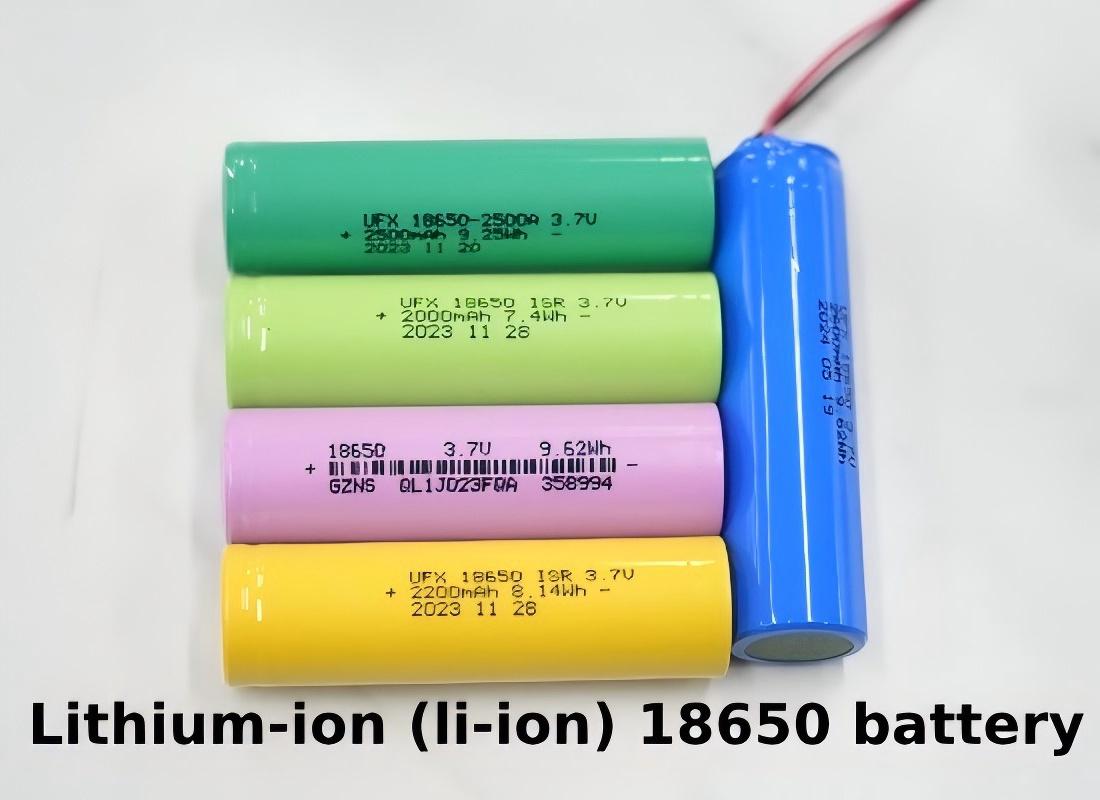Blog
18650 Rechargeable Battery: The Complete Guide
2025-09-21 | Eric

The 18650 lithium-ion cell is one of the most widely used rechargeable battery formats today. Compact yet powerful, it powers everything from flashlights and laptops to electric bicycles and energy storage packs. In this guide you’ll learn what an 18650 battery is, key specifications, pros and cons, common applications, safe handling and practical care tips — plus quick answers to frequently asked questions so you can choose and use 18650 cells confidently.
Table of Contents
- What is an 18650 Rechargeable Battery?
- Key Specifications of 18650 Batteries
- Advantages and Disadvantages
- Common Applications
- Care and Maintenance Tips
- Frequently Asked Questions (FAQs)
What is an 18650 Rechargeable Battery?
The 18650 battery is a high-performance lithium-ion rechargeable cell known for its compact size, high energy density, and long lifespan. The term “18650” refers to its dimensions: 18mm in diameter and 65mm in length. These batteries typically operate at 3.6 to 3.7 volts, with capacities ranging from 1800mAh to 3600mAh.
Thanks to their reliable discharge characteristics and ability to deliver high current, 18650 batteries have become a standard power solution across various industries, including consumer electronics, electric vehicles, medical devices, and renewable energy systems.
Key Specifications of 18650 Batteries
Understanding the technical details of 18650 batteries helps ensure optimal use and safety.
Core Technical Specs:
| Specification | Details |
|---|---|
| Size | 18mm diameter × 65mm length |
| Nominal Voltage | 3.6V – 3.7V |
| Capacity Range | 1800mAh – 3600mAh |
| Charging Voltage | 4.2V (typical) |
| Discharge Cut-off Voltage | 2.5V – 3.0V |
| Energy Density | High (up to 250 Wh/kg) |
| Cycle Life | 300 – 500 full cycles (some models exceed 1000 cycles) |
| Discharge Current | 5A to 30A depending on the model |
| Weight | 45g – 50g |
| Chemistries | LiCoO₂, LiFePO₄, LiMn₂O₄, NCA, NCM |
🔍 Did You Know? Tesla’s early Model S battery packs were built using thousands of 18650 cells due to their energy density and thermal stability.
Advantages and Disadvantages
✅ Advantages
- Stable Voltage Output: Ensures consistent performance during discharge.
- High Energy Density: Stores more power in a smaller form factor.
- Rechargeability: Supports hundreds of cycles with minimal degradation.
- Low Self-Discharge: Retains charge when not in use, enhancing storage reliability.
- Low Internal Resistance: Allows efficient energy transfer with minimal heat generation.
- Minimal Memory Effect: No need to fully discharge before recharging.
❌ Disadvantages
- Thermal Runaway Risk: Improper charging or physical damage may lead to overheating or explosion.
- Performance Degradation: Over time, cycle life and capacity diminish.
- Specialized Charging Requirements: Needs precise voltage/current regulation and protection circuits.
- Non-Universal Compatibility: Must match exact specs with device requirements.
⚠️ Important: Always use certified chargers and avoid physical damage to ensure safe operation.
Common Applications
Where 18650 Batteries Are Used
| Industry/Application | Why 18650? |
|---|---|
| Laptops & Tablets | High capacity supports extended use without bulk. |
| Power Banks | Rechargeability and energy density make them ideal for portable charging. |
| LED Flashlights | Consistent output and long runtime suit high-drain lighting needs. |
| Power Tools | High discharge current and durability for professional-grade tools. |
| Vape Devices | Reliable and stable power delivery in compact spaces. |
| Electric Vehicles & E-Bikes | Scalable into battery packs for efficient, long-range mobility. |
| Medical Devices | Dependable power in compact form for portable diagnostic and therapeutic equipment. |
| Solar Energy Storage | Ideal for storing energy with long cycle life and minimal maintenance. |
| Robotics & Drones | Lightweight, powerful, and easy to integrate into DIY and commercial applications. |
Care and Maintenance Tips
Charging Best Practices
- Use dedicated Li-ion chargers with overcharge protection.
- Disconnect once fully charged; avoid prolonged charging.
- Monitor for overheating during charging sessions.
Storage Guidelines
- Store in a cool, dry place (ideal: 20–25°C / 68–77°F).
- Keep away from direct sunlight, moisture, or flammable materials.
- If unused for long periods, store at ~50% charge to prevent degradation.
Usage Recommendations
- Avoid full discharge; recharge before battery drops below 3.0V.
- When using multiple batteries, match age and charge levels to prevent imbalance.
- Regularly use and cycle batteries to maintain health.
Safety & Inspection
- Choose batteries with built-in protection circuits (PCB/PCM).
- Inspect monthly for bulging, corrosion, or leaks.
- Clean terminals periodically with a dry cloth to maintain optimal conductivity.
Pro Tip: Rotate battery sets if using in pairs to ensure even wear and extended longevity.
Frequently Asked Questions (FAQs)
Q1: Can I use any 18650 battery in my device?
A: No. Always check your device's voltage and current requirements. Using incompatible batteries can cause malfunction or pose safety risks.
Q2: How long does an 18650 battery last?
A: With proper care, most 18650 batteries last 2–3 years or 300–500 charge cycles, though high-quality models may exceed this.
Q3: Are protected or unprotected 18650 batteries better?
A: Protected batteries are safer and ideal for general use. Unprotected batteries offer higher discharge rates but are best for experienced users or specific high-drain applications.
Q4: How do I dispose of 18650 batteries?
A: Recycle them at a certified e-waste or battery disposal center. Never throw them in regular trash due to potential fire hazards.
Conclusion: Is the 18650 Battery Right for You?
Whether you're building a custom power bank, upgrading your flashlight, or sourcing batteries for industrial applications, the 18650 lithium-ion battery delivers outstanding performance, safety, and longevity when used responsibly.
Popular Articles
Contact Details
Worktime :Monday to Friday 9am - 6pm (HKT)
WhatsApp/Wechat/Mobile :+8613645616165
Email : info@lifepo4cellstore.com
